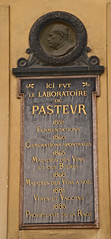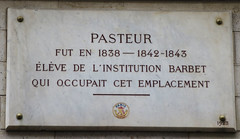Louis Pasteur
Commemorated on 5 plaques
Ici fut le Laboratoire de Pasteur. 1857 Fermentations 1860 Gén´rations spontanées 1865 Maladies des Vins et des Bières 1881 Virus et Vaccins 1855 Prophylaxie de la Rage.
English translation: Here was the Pastor's Laboratory. 1857 Fermentations 1860 spontaneous generations 1865 Diseases of Wines and Beers 1881 Viruses and Vaccines 1855 Prophylaxis of the Rage. [AWS Translate]
45, rue d'Ulm, Paris, France where they worked
Pasteur fut en 1838 - 1842-1843 élève de l'institution Barbet qui occupait cet emplacement
English translation: Pasteur was in 1838-1842/1843 a student of the Barbet Institution which occupied this location
8 rue des Feuillantines, Paris, France where they studied
Louis Pasteur 1822-1895 scientifique, fondateur de la microbiologie et découvreur du vaccin contre la rage, est né dans cette maison.
English translation: Louis Pasteur 1822-1895 scientist, founder of microbiology and discoverer of rabies vaccine, was born in this house.
43 rue Pasteur, Dole, France where they was born (1822)
Louis PASTEUR fut baptisé dans cette église le 15 Janvier 1823.
English translation: Louis Pasteur was baptised in this church on January 15, 1823.
Place Nationale, Dole, France where they was baptised (1823)
Louis Pasteur (1822 – 1895) . Doyen de la faculté des sciences de Lille en 1854, c’est dans son laboratoire de Lille que Louis Pasteur commença ses études sur les phénomènes de la fermentation. Après le traitement des vins, ses observations sur la fabrication du vinaigre et de la bière, il triompha de la maladie des vers à soie et aborda l’étiologie des affections virulentes et contagieuses : charbon, septicémie , rouget etc.. La découverte de l’atténuation des virus et la prophylaxie de la rage furent ses suprêmes conquêtes. Ses admirables découvertes, base d’une science nouvelle, le placent au premier rang des bienfaiteurs de l’humanité.
English translation: Louis Pasteur (1822 — 1895). Dean of the Faculty of Sciences of Lille in 1854, it was in his laboratory in Lille that Louis Pasteur began his studies on the phenomena of fermentation. After the processing of the wines, his observations on the manufacture of vinegar and beer, he triumphed over the disease of silkworms and tackled the etiology of virulent and contagious diseases: coal, sepsis, redhead etc. The discovery of virus mitigation and the prophylaxis of rabies were his supreme conquests. His admirable discoveries, the basis of a new science, place him at the forefront of humankind's benefactors. [AWS Translate]
Place Charles de Gaulle, Lille, France where they worked





